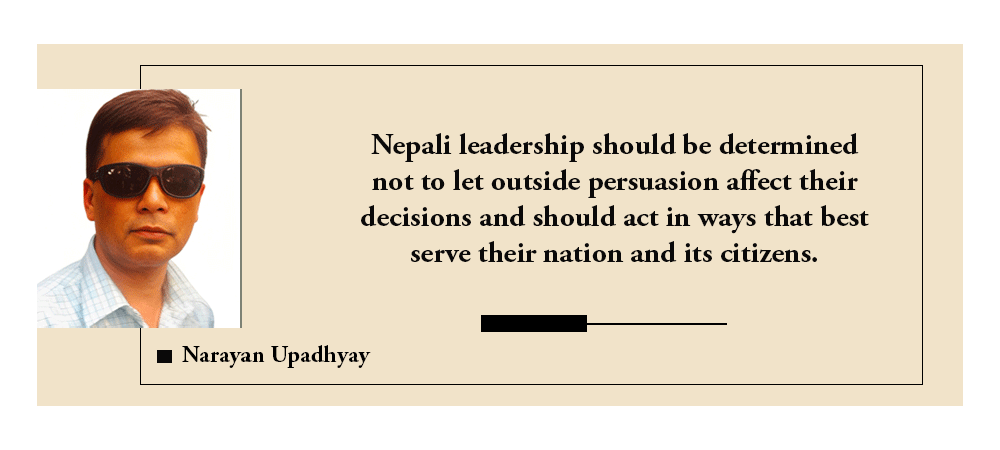- Thursday, 19 February 2026
Flurry Of Diplomatic Visits Nepal Gains Geopolitical Traction?
A slew of international dignitaries, ministers, diplomats, and army officials have descended on Nepal in recent days, sparking surfeit of speculations about why and for what they've come here, especially given that Prime Minister Pushpa Kamal Dahal Prachanda's coalition administration has just been in place for approximately two months and our presidential election is just around the corner. The Kathmandu grapevine, journalists, media outlets, political analysts, pundits, and others appear busy devising their opinions on these arrivals. Many saw these arrivals as no coincidence as they have occurred when Nepal is preparing to hold elections for its new president. In general, foreign dignitaries' visits are part of high-level visit exchanges aimed at strengthening bilateral ties and expanding economic cooperation.
However, some observers see the latest influx of foreign diplomats, ministers, and high-level officials is also intended to persuade Nepal's political parties, leaders, and coalition government to support a specific candidate after the three major parties — the CPN-Maoist Centre, the CPN-UML, and the Nepali Congress — have locked horns on the issue. The UML chief, KP Sharma Oli, has said that the presidential candidate must be from his party, and the Prime Minister must honour the agreement reached between the two parties. The Nepali Congress is hoping to gain from Prime Minister Prachanda's recent tilt towards the party in the race for presidency.
Influence
Have visiting diplomats and minister succeeded in influencing our leaders, particularly Prime Minister Prachanda, who has now stated that he would prefer to go for a non-UML candidate? Have the West and India favoured this option? Is the PM’s latest tilt towards the Nepali Congress is an outcome of this persuasion? Only time will tell, but the presence of so many foreign diplomats and ministers suggests that these visits are about more than just strengthening bilateral ties and collaboration. They might have communicated their views for a new president to the people who count the most in Nepali politics.
Four of five US dignitaries have come to Nepal in quick succession, while the question of a new president is being actively debated within Nepal’s political domain. A few days ago, all prominent Nepali leaders from the ruling coalition and opposition parties welcomed the arrival of India's foreign secretary, Vinay Mohan Kwatra, who previously served as an Indian ambassador to Nepal. Surprisingly, five former Indian army commanders visited Nepal simultaneously as guests to celebrate Nepal Army Day. Ministers and diplomats from Britain, South Korea, and other "friendly countries" also arrived, probably with messages from their respective governments.
Meanwhile, China's Ambassador to Nepal is meeting with prominent Nepali politicians, including Prime Minister Prachanda and UML chairman KP Sharma Oli. Notwithstanding the fact that no foreign ambassadors or emissaries have spoken out on the president's election, many people feel they might have influenced or sought to influence our politicians on the matter. Commentators on Nepal's diplomacy and international relations examine these visits in light of the approaching presidential election on March 9, for which parties have yet to settle on their candidates' names.
According to some political pundits, it is believed that nations from Europe, the United States, and India are opposed to having a new president of Nepal from the UML camp in light of Oli's unconstitutional actions which also saw the current President siding with him by undermining her constitutional roles as the ceremonial head of the state. They may prefer a consensus candidate who is backed by Nepali Congress, Maoist Centre, and others. However, it appears that China has sided with the government coalition's left-wing parties such as the Maoist Centre and UML and does not favour any president who comes into power through "backchannel manoeuvering" by Western countries or India.
The arrival of several international dignitaries at present suggests Nepal's rising relevance in regional and global politics and diplomacy. It also highlights an irrefutable truth: Nepal figures in international diplomacy because of its strategic position. Nepal's strategic location as a Himalayan gateway makes it an essential country for trade and geopolitical influence in the area. It is recognised as a major actor in ensuring South Asian regional stability. Nepal has also been an active participant in peacekeeping missions in crisis zones across the world.
International power
International powers recognise the tiny Himalayan country's potential for economic growth and development, as it has made strides in infrastructure development, including airport expansion, highway and road building, and hydropower project development. It has an abundance of natural resources, including water, minerals, and forests. This attracts international investment, particularly from neighbouring nations that want access to these resources. Nepal also has extensive cultural and historical links with India, China, and the West, which have led to these nations' long-standing interest in the country.
Having said that, it is clear that Nepal's unique position in the international arena has attracted the attention of foreign nations. Consequently, high-profile visits have become regular occurrences, with foreign diplomats, ministers and officials often visiting the country to express the views of their respective governments. Nevertheless, Nepali leadership should be determined not to let outside persuasion affect their decisions and should act in ways that best serve their nation and its citizens. Therefore, they ought to have the courage to stand against any external force or persuasive tactics while making critical choices that prioritise Nepal's well-being above all else. However, this leaves us with a question: are our leaders equipped enough to do so as they often display the tendency of swaying towards foreign powers when it suits them?
(Upadhyay is Managing Editor of this daily.)















-original-thumb.jpg)
